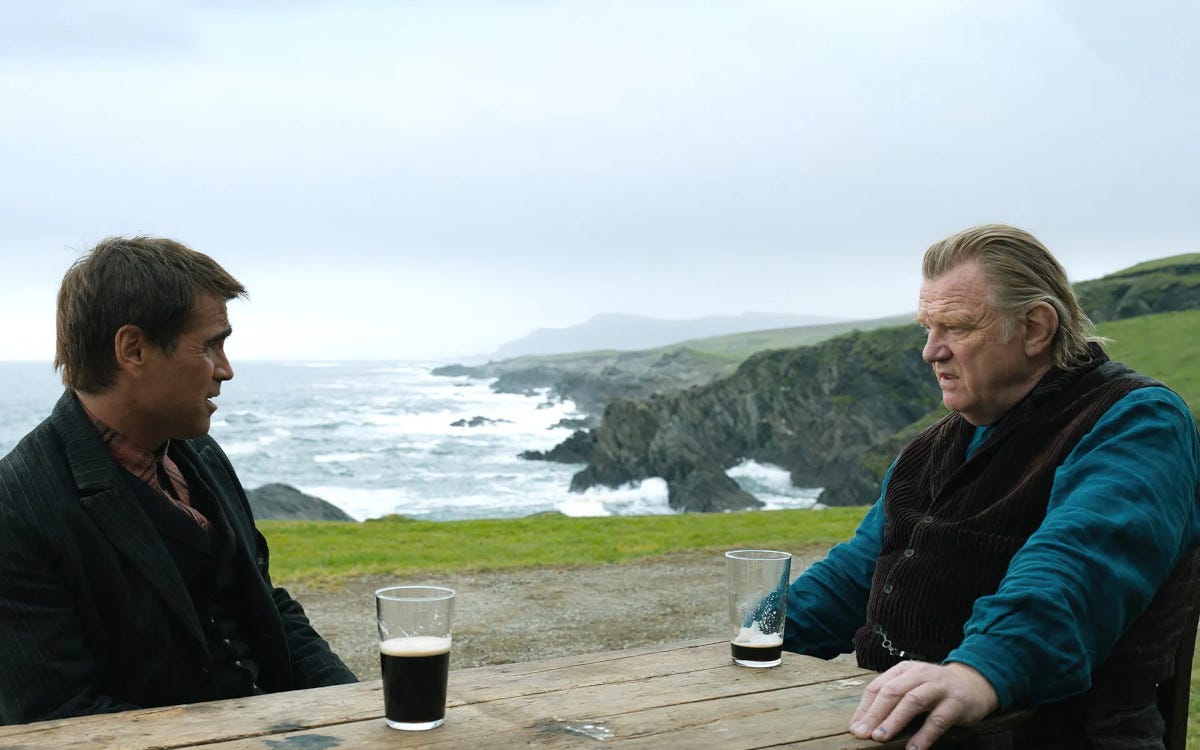Now That You’ve Seen ‘The Banshees of Inisherin,’ Let’s Talk About That Plot Twist

The Banshees of Inisherin, the tragicomedy starring Colin Farrell and Brendan Gleeson, just won three Golden Globe Awards for best actor, best comedy, and best screenplay. The film is a sardonic commentary on the Irish Civil War and a nuanced meditation on loneliness—and it takes a sudden, dark turn in the second act.
The film centers on Pádraic (Farrell) and Colm (Gleeson), two old friends on an isolated island off the coast of Ireland. After Colm decides he doesn’t want to be friends with Pádraic anymore, Pádraic pesters him until Colm says he’ll cut his own fingers off if Pádraic ever speaks to him again. And then he makes good on his promise.
As an irreversible act of self-harm, destroying one’s hand would be a serious threat coming from anyone. With Colm, though, there’s an added layer of pathos: He’s an accomplished fiddler and composer. By cutting his fingers off, Colm sacrifices a core part of his identity and the main source of meaning in his life—and he makes sure the entire island knows that it’s Pádraic’s fault.
But why does he do it?
Related: 2022’s Sight & Sound Top 100 Movies Poll Demonstrates Film Culture Is Online Culture on The Escapist
Why does Colm cut off his fingers?
In order to understand why Colm cuts his fingers off, you have to understand how he sees Pádraic.
Colm’s official stance is that he doesn’t like Pádraic anymore because he is a boring, trite person. That’s a common enough reason to let a friendship die, but it’s a flimsy excuse for throwing pieces of your own body on someone’s doorstep.
We get some insight into Colm’s troubles, though, when Pádraic’s sister Siobhán calls him out. Colm calls Pádraic boring, and Siobhán blows up, shouting, “You’re all boring!”
For most of the film, Colm certainly doesn’t seem to think he’s boring. He prides himself on his musical talent, telling Pádraic that bringing new tunes into the world gives his life meaning. He fills his home with interesting odds and ends. He invites students from around Ireland to study under him. Siobhán confronts him with a truth he doesn’t want to face: having talent doesn’t make him any better than the island’s other inhabitants. As Pádraic points out in the pub, simple kindness is a more admirable quality than comparing yourself to Mozart.
And deep down, Colm knows it. After he finishes his final tune and puts a violent end to his fiddling career, he admits that he’s relieved. Now he’s truly just like everybody else, living the same supposedly meaningless existence he spent his life denigrating. When Pádraic comes to burn down his house, Colm decides to consign himself to the flames. It seems that Pádraic has been a projection of Colm’s own self-loathing all along.
The ending of The Banshees of Inisherin, explained
If only Colm hadn’t thrown his fingers at Pádraic’s house. If only Jenny the donkey hadn’t tragically died after trying to eat them. Then Colm’s house might still be standing, Pádraic would be a happier person, and Inisherin would still be home to the sweetest miniature donkey ever to grace God’s green Earth.
The end of the film depicts the literal deaths that Inisherin’s resident banshee, Mrs. McCormick, prophesied, but there’s also spiritual death. Pádraic becomes a meaner, more bitter version of himself, living alone and willing to murder the man who was once his closest friend. Colm gives up music forever, but doesn’t find anything else to fill the void.
If you look at it from the right angle, you can see a faint trace of hope at the end. Colm decides to escape the burning house after Pádraic leaves him an exit, and the two seem like amicable enough enemies in the final scene, even though their feud hasn’t ended. But the path to healing, if there is a path at all, will be long and fraught.
(featured image: Searchlight Pictures)
Have a tip we should know? [email protected]
